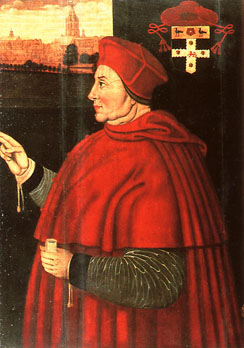Henry VIII made a brash decision to sign the Act of Supremacy, bestowing upon himself the authority over the Church of England, in order to be able to divorce his wife Catherine, who would not give him a son, and marry the younger Anne Boleyn. By making himself head of the Church of England, Henry disconnected himself from Rome and the Vatican, and had not only the power of the crown, but also the power of the supreme religious leader. Consequently, he also gave himself the ability to marry any woman who would have him, since he had the power to divorce any of his wives should he so choose. Catherine of Aragon was the first victim of this. In signing the Act of Supremacy and divorcing Catherine, Henry pushed his power to its limits, and abused the privileges he already had in order to steal more away unjustifiably, angering Catherine, the Holy Roman Empire, and many of Henry's subjects, even though some did happen to be in agreement.
On a personal level, Catherine could not have been fond of Henry's decision to take away her position as queen and divorce her for a younger woman, all because she could not produce a son. She had been in power for 24 years, serving her husband faithfully and attempting to give him an heir many times, but all of her children were miscarried, stillborn, or died in infancy, except for one: Mary. Henry was displeased with her and thought their marriage was cursed. When the Vatican would not let him divorce Catherine, he made himself head of the Church of England and broke Catherine's heart, sending her away as Princess Dowager and moving on to Anne Boleyn. None of the years Catherine was faithful to Henry mattered to him; all that he cared about was his wife producing an heir for him. Catherine, on the other hand, loved Henry with all her heart until her dying day. In Catherine's opinion, and the opinions of many who agree with her, it was surely not right for Henry to divorce her without her having any say, and Henry should not have done away with her for such petty reasons.
The Holy Roman Empire, on a more political and religious standpoint, thought that Henry was overstepping his boundaries as king when he intruded on the position of a religious leader. The Vatican, at this time, had a lot of power. The Holy Roman Empire had started out small in 843, but it had grown to cover much of Europe between that time and the time of Henry VIII's reign. Also during this time, the Holy Roman Emperor in charge of the entire empire was Charles V. Holy Roman Empire Charles V happened to be the nephew of Henry VIII's wife he was trying to divorce: Catherine of Aragon. Not only did the Holy Roman Empire disagree on this attempted divorce on religious grounds, but Charles was surely somewhat biased in his decision to not annul Henry's marriage, because he was working partly on the behalf of his family. Though this partisan was not completely right, Henry should have yielded to the ruling of the Holy Roman Empire instead of cutting himself and England off completely to satisfy his need for an heir.
Not only were people of authority against Henry's decision, but many of his subjects and people under him were too. Cardinal Thomas Wosley lost his job and was executed as a result of Henry's discord with the Church, and he surely thought Henry trying to overpower the Vatican was not the best idea. He did all that he could to try to give Henry what he wanted, but it was not enough. Henry, crazy with supreme political and now religious power, ordered Wosley to be killed. Murder on undeserved grounds is never ok, and this resulting from Henry's splitting from the Church to divorce Catherine helps to show how Henry's choice was not right. On the other hand, there were those such as Thomas Cranmer, who were very much in favor of Henry's decision to separate from the Church in order to divorce Catherine of Aragon. Being the Archbishop of Canterbury, Cranmer provided a decent opposing view of Wosley, since both of them held much religious power in King Henry's court at one point in time.
Judging from the viewpoints of many different people in many different positions, as a whole this withdrawal from the Vatican was initially an unjustifiable act of Henry VIII. Some good that came of it in time, though, was a sense of English nationalism when Elizabeth I continued Henry's religious establishment and made Protestantism such a big part of England that is was deeply intertwined in the culture itself. Henry's decision does show that some good can always come from bad. Nevertheless, there were many more people who disagreed with Henry's choice than those who did agree with his choice, and despite those opinions, Henry took control and forever changed the fate of England.
Works Cited:
Catherine of Aragon. "Primary Sources - Letter of Katharine of Aragon to Her Husband, King Henry VIII, 7 January 1536." EnglishHistory.net. Web. 28 Sept. 2010. <http://englishhistory.net/tudor/letter5.html>.
Cranmer, Thomas. "Medieval Sourcebook: Letter of Thomas Cranmer, 1533." FORDHAM.EDU. Fordham University. Web. 28 Sept. 2010. <http://www.fordham.edu/halsall/source/cramner-hen8.html>.
"Habsburg History - European Monarch Genealogy." Welcome - European Monarch Genealogy. Web. 28 Sept. 2010. <http://www.monarchgenealogy.com/habsburghistory.htm>.
Hall, Edward. "Primary Sources: The Fall of Cardinal Thomas Wolsey, 1530." EnglishHistory.net. Web. 28 Sept. 2010. <http://englishhistory.net/tudor/priwols1.html>.
"HOLY ROMAN EMPIRE--1500." McMurry University | Christian College | Universities In Texas. Web. 28 Sept. 2010. <http://www.mcm.edu/academic/depts/history/maps/HOLYROMEMPIRE.html>.
"HOLY ROMAN EMPIRE--1500." McMurry University | Christian College | Universities In Texas. Web. 28 Sept. 2010. <http://www.mcm.edu/academic/depts/history/maps/HOLYROMEMPIRE.html>.
"The Act of Supremacy." Then Again. . . Web. 27 Sept. 2010. <http://www.thenagain.info/Classes/Sources/ActSupremacy.html>.
"The Holy Roman Empire’s Imperial Diet: Electoral Votes in 1792." The Napoleon Series. Web. 28 Sept. 2010. <http://www.napoleon-series.org/research/government/c_holyroman.html>.





